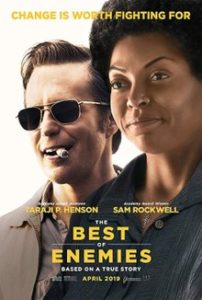
The Best of Enemies (2019)
Available on Amazon Prime and Netflix
Written and directed by Robin Bissell
Starring Taraji P. Henson and Sam Rockwell
In the last few years, Hollywood has been frantically putting out woke movies, and particularly movies that deal with racism. So when K decided that we should watch The Best of Enemies as our movie of the week, I was skeptical. But then I looked at some critical reviews. And all of the most woke critics hated it. So, I watched it. And enjoyed it. And I like it even better today, after thinking about it.
If you can put your ideological glasses aside, you might like it too, because it is a good movie, with an emotionally compelling plot and two outstanding performances by the lead actors.
The Best of Enemies is based on a true story: a very unlikely relationship that developed between C.P. Ellis, a White Supremacist (played by Sam Rockwell), and Ann Atwater, a Black community organizer (played by Taraji P. Henson), in a dispute over school integration in Durham, North Carolina, in 1971.
At the surface level (which may be all that writer/director Robin Bissell intended), it’s a touching, almost Hallmark-sentimental, story about understanding overcoming prejudice. And it might have played that way a decade ago… or even as recently as 2018, when Green Book, which was similar in some respects, won the Academy Award for Best Picture.
But that was then. Seeing it today, in our hyper-racialized culture of BLM, it’s impossible to take it that simply. Race reconciliation stories are no longer acceptable, even if they are based on true events.
If you favor that perspective, you won’t like the movie, because it’s more about the White man than the Black woman, treats the problems of racism too superficially, and suggests an outcome (amenity between the races) that is, from a Critical Race Theory viewpoint, morally corrupt.
I didn’t feel that way. But it left me with two thoughts:
* There is a big difference between the legal, political, and criminal justice systems that were operating in North Carolina in 1971 and those that exist throughout America today. And the difference is precisely what CRT disputes. Anti-Black racism was systemic back then. Today, there is plenty of racism of all types, but, systemic, anti-Black racism no longer exists.
* The big struggle of the civil rights movement was about integration – and particularly integration in public schools. That’s what this movie was about, too. It ends on a high note – with the former Klansman voting to integrate the local school. But did school integration achieve its goals? Has public-school integration made African-American children any better educated or better off in any other way 50 years later?
The Best of Enemies is not a great movie, because it does look at this amazing story in a rather sentimental, superficial way. But it is a good movie because the story, as objectionable as it is from a CRT/BLM perspective, is a worthy one. And because, however you feel about it, it challenges you to think outside the box.
Critical Reviews
* “This tale of a KKK president seeing the error of his ways – and bonding with a civil-rights activist – feels all kinds of wrong.” (Nick Schager, The Daily Beast)
* “It’s impossible to ignore that the film is yet another Hollywood narrative of racial reconciliation centered on a white protagonist – and worse, it’s one that seems much more interested in the Klan’s white targets than its black ones.” (Inkoo Kang, Slate)
* “Instead of three-dimensional characters, The Best of Enemies gives us two wax figures in a cardboard town, and they’re all at the mercy of Bissell as writer/director.” (Matt Cipolla, The Spool)
You can watch the trailer here.
 MarkFord
MarkFord